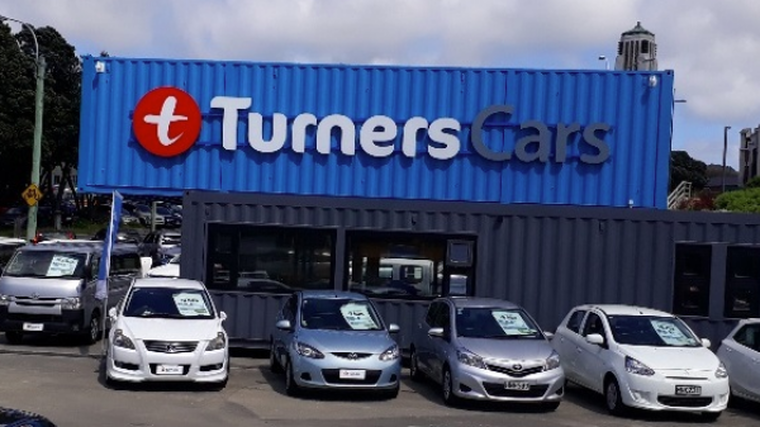Group hails record earnings

Turners Automotive Group has reported record earnings for the year to March 31, 2023, with revenue increasing 13 per cent from the previous financial year to $389.6 million.
The company says the performance demonstrates its earnings resilience despite tough economic conditions, including rapid interest rate rises, and lingering impacts of the Covid-19 pandemic in the first half.
While it notes the interest rate cycle may impact the timing of its target of hitting $50m net profit before tax (NPBT) in the 2025 financial year, “it continues to achieve strong results in challenging conditions and to strengthen its position for the next upcycle”.
Other key highlights in the 2023 financial year included:
• Earnings before interest and tax of $52.2m, up nine per cent from the previous financial year
• NPBT of $45.5m, up six per cent
• Net profit after tax of $32.6m, up four per cent
• Full-year dividend of 23 cents per share (cps), no change
• Earnings per share of 37.7cps, up four per cent
Turners revealed record earnings in its automotive retail and insurance divisions more than offset finance headwinds as it announced its annual results on May 23.
For auto retail, Turners’ largest division, its market share gains and margin improvement led to a 28 per cent increase in profit, following a 26 per cent rise in the 2022 financial year.
There was also market share growth and improved claims ratios in its insurance business.
Revenue was up 15 per cent year-on-year in automotive retail to $278.2m, 13 per cent in finance to $58.6m and eight per cent in insurance to $43.6m.
A breakdown of the profit numbers shows automotive retail grew 28 per cent to $25m, while insurance clocked a nine per cent increase to $12.6m.
Turners notes the finance division’s profit was down 17 per cent to $15m due to rapid official cash rate increases that saw credit quality, regulatory compliance and margin management become the priority during the year. Profit for credit management was largely unchanged at $2.9m.
Todd Hunter, chief executive officer, says: “Two of our three major divisions continue to perform strongly with our third, finance, well positioned as market conditions change.
“This strong performance reflects the success of our diversification strategy, our de-risking initiatives as well the quality of our team.
“Our marketing and customer service are proving successful. Turners is increasingly seen as the leading brand in the used car market and as the number of used car outlets across New Zealand continues to contract, we see further opportunity to consolidate our position.
“While we are weathering tough economic conditions, we expect these headwinds to intensify before we are through the current inflation cycle. However, we are well-positioned and will continue to look for organic growth opportunities to further our lead in what are uncertain and rapidly changing market conditions.”
In an online presentation of its results on May 23, Turners said auto revenues had grown off increased car and damaged vehicle unit sales, while new branches and more owned stock flowing through the business had helped grow its market share.
Hunter also highlighted the changes over the past four years, with NPBT rising from $29m in the 2019 financial year to $45.5m.
Over the same period, its number of locally sourced vehicles grew from 16,179 units to 24,089 and its market share for automotive retail climbed from 4.9 per cent to 8.7 per cent.
Other results
Other notable figures from the 2023 financial year included interest expense rising 110 per cent year-on-year to $13.3m, reflecting changes in the official cash rate.
However, Turners explains this impact was mitigated by finance margin management and regular pricing increases.
It says debt load is increasing in credit management and it feels well positioned for the next stage of the New Zealand credit cycle.
The company described its strong culture as a key advantage in the market, ranking in the top five per cent of consumer businesses globally, and its employee share scheme was launched during the reporting period with almost 50 per cent take up.
It predicts macro headwinds, such as inflation, interest rates, and economic conditions, are likely to feature in the year ahead with uncertainty and speed of change key features.
Nevertheless, it aims to continue organic growth momentum in automotive retail through branch expansion, shifting more sales into retail channels, and further traction from its “Tina” marketing campaign.
Grant Baker, chairman, says the latest financial result underscores the company’s confidence in the resilience of the used car market through the cycle.
“Our leadership position for quality, technology, national coverage, branding and customer service has created a robust growth platform that continues to deliver,” he adds.
“We have achieved these results at a time when retail generally has been under pressure. The used car market is needs-based and stable through downturns, as we envisaged. Our diversified business is well-placed to deliver further growth as well as offering solid returns to shareholders.”
Automotive retail
Turners’ market share continued to grow throughout the past financial year with retail unit sales up six per cent to around 19,500 units, and wholesale auction unit sales rising 25 per cent to around 14,700 units.
Total units sold through auction were 18,500 compared to 14,730 the year prior, due to adding fleet partners ex-lease consignment vehicles. “Owned” unit sales in was up nine per cent to 24,000, and margin on such sales rose 11 per cent.
Turners says its domestic sourcing strategy has produced faster stock turnover and it continues to operate off lower inventory levels.
“Increasing local sourcing versus used imports has been beneficial,” the company adds. “The government’s clean car programme has reduced the number of imported cars coming into the country which has increased the value of used car units and increased our margins.”
Nelson and Rotorua branches are now “fully operational and performing above expectations”, while retail expansion in the pipeline for Christchurch, Napier and Timaru offers additional profit contributions over the coming years.
Turners Subscription passed 300 concurrent subscriptions in February this year and around 80 per cent of subscription-owned cars are low-emissions vehicles.
Finance
Solid revenue growth was set against an additional $7m in interest expense over financial year 2022 levels due to the rapid rise in OCR.
While the finance division proactively reviewed pricing to mitigate OCR rises, Oxford’s 12 base rate rises, lifting 4.1 per cent, since October 2021, compares to an OCR movement of five per cent.
“This meant that growth moderated as credit quality, regulatory compliance and margin became higher priorities,” adds Turners.
Oxford loan arrears continue to track at half the levels of the wider market and the company is confident the finance division is well placed to grow again once interest rates stabilise.
Insurance
Despite challenging market conditions, Turners’ insurance division achieved robust sales growth.
“Digital distribution arrangements are continuing to work well with further opportunities in the pipeline.
“Inflation in the cost of claims was offset by frequency of claims reducing due to changes in consumer behaviour, including working from home and cost of living increases impacting mobility and vehicle use.”
Credit management
The credit management business saw debt value loaded increase by 20 per cent, or $22m, compared to the previous financial year.
“However, 80 per cent ($18m) of this was from harder to contact and collect second placement debt. Debt value collected was down nine per cent to $34.4m due to reduced customer payment capacity requiring lower repayment amounts to be accepted.
“By year end and into the start of the coming year there were indications that the economic downturn was producing conditions that may support improved results for credit management.”
Looking ahead
Turners says it is resilient, well-diversified and poised for further growth. Contributing to this outlook are the following factors.
• Used car market is resilient: Twenty per cent of the vehicle fleet is more than 20 years old. Replacement demand underpins transaction volumes.
• Diversified business: Geographic diversity and earnings diversity across the group.
• High “trust” brands: Consumers move to high-trust brands in times of uncertainty and the Turners brands continue to grow in strength.
• Quality: Turners has de-risked in a number of areas with quality metrics improving in finance and insurance.
• Growth: Good track record of organic growth delivery with further opportunity to come. Halo effect from auto retail expansion includes positive uplift for finance and insurance divisions.
Some of the key areas it expects to underpin its earning growth from now until the end of the 2025 financial year include expanding its automotive retail branches, optimisation of unit sales from wholesale to retail, and growth in premium lending.
“Whilst the pandemic uncertainty has decreased, NZ’s economic uncertainty has increased,” explains Hunter.
“In an environment where costs are up significantly, interest rates have never increased faster, there has been more government regulation in finance and vehicle markets than ever before, and Turners’ business has continued to perform.”
In automotive retail, Turners expects to see upside from its new branches in the second half of the current financial year and the supply-constrained market to continue primarily due to impacts on the new car supply chain and government regulation.
Hunter says: “Domestic supply will be an advantage for Turners and the transition of wholesale auction units into retail sales channel will underpin further market share growth.”
For finance, quality and margin management remain key priorities, while in insurance it expects new policy sales to be buoyant based on its distribution and market share gains.
The company notes it has had a solid start to the 2024 financial year with the profit result for April 2023 showing positive growth against the prior period.





